Campaign Legal Center (CLC) and Southern Poverty Law Center (SPLC) submitted a letter to Alabama Secretary of State John Merrill expressing disappointment in the erroneous and misleading description of Alabama’s felony disenfranchisement laws in an October 3, 2019 press release from Merrill’s office.
Secretary Merrill’s statement, coupled with his office’s general inaction in educating voters about House Bill 282 threatens to confuse people with convictions further about their voting rights in Alabama. The letter requests that Merrill clarify his statement to the public so that it is consistent with the law.
The letter lays out specific errors in Secretary Merrill’s statement:
- Individuals who are not convicted of felonies of moral turpitude never lose the right to vote because of their convictions. They are not, as Merrill’s statement implies, restored to voting rights only after completing their sentence.
- Alabamians who have been convicted of felonies of moral turpitude can restore their right to vote after they have completed all terms of their sentence. Indeed, Alabamians with moral turpitude convictions are the only people who need to apply to restore their right to vote. Merrill’s statement, however, implies that they may not.
- No one is simply “re-entered into the rolls.” Alabama does not have automatic voter registration nor automatic voting rights restoration for people with convictions. For people with felony convictions who have lost their right to vote, voting rights restoration and re-registration are separate moments in the process of being able to vote again.
The letter also requests that Secretary Merrill take down the misleading press release from the Secretary of State’s website immediately and issue a correction.
As Alabama’s chief election official, Secretary Merrill should be spreading information about the restoration of voting rights and encouraging eligible individuals to apply for CERVs, not spreading misinformation. Below are six steps, outlined in the letter, that Secretary Merrill should take in implementing HB 282:
- Update Alabama’s voter registration form and the Election Assistance Commission’s instructions for the federal voter registration form to explain the eligibility requirements after HB 282, including a list of the felonies of moral turpitude;
- Place voters whose registration applications were denied or who were struck from the voter registration rolls in the last two years, and whose eligibility was affirmed by HB 282, back on the voter registration rolls and provide them with individual notice of their eligibility to vote;
- Provide mandatory training to registrars on HB 282 and the CERV process so they can provide accurate information to potential voters;
- Include information about the CERV process on any notices of denial of registration or removal because of a felony of moral turpitude;
- Engage in sustained public education campaign to include as many eligible voters in Alabama who have prior convictions in the democratic process; and
- Develop and provide guidance materials to the Alabama Department of Corrections on HB 282 so that corrections officers can allow incarcerated Alabamians without convictions of moral turpitude the opportunity to vote in upcoming elections.
Read the full letter here.
CLC and SPLC partnered together for the Alabama Voting Rights Project to restore voting rights to people with past convictions in Alabama by providing direct rights restoration services, empowering community leaders to understand rights restoration laws in the state, and breaking down the false notion that a felony conviction always means you cannot vote.
Learn more about CLC efforts to restore voting rights in Alabama and across the country.
This post was written by Sheely Edwards, a 2019 CLC Hinckley intern, and student at the University of Utah.
